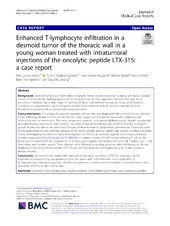| dc.contributor.author | Jebsen, Nina Louise | en_US |
| dc.contributor.author | Apelseth, Torunn Oveland | en_US |
| dc.contributor.author | Haugland, Hans Kristian | en_US |
| dc.contributor.author | Rekdal, Øystein | en_US |
| dc.contributor.author | Patel, Hamina | en_US |
| dc.contributor.author | Gjertsen, Bjørn Tore | en_US |
| dc.contributor.author | Jøssang, Dag Eirik | en_US |
| dc.date.accessioned | 2019-08-23T09:11:03Z | |
| dc.date.available | 2019-08-23T09:11:03Z | |
| dc.date.issued | 2019-06-10 | |
| dc.Published | Jebsen N, Apelseth TO, Haugland HK, Rekdal Ø, Patel, Gjertsen BT, Jøssang DE. Enhanced T-lymphocyte infiltration in a desmoid tumor of the thoracic wall in a young woman treated with intratumoral injections of the oncolytic peptide LTX-315: A case report. Journal of Medical Case Reports. 2019;13:177 | eng |
| dc.identifier.issn | 1752-1947 | |
| dc.identifier.uri | https://hdl.handle.net/1956/20715 | |
| dc.description.abstract | Background: Desmoid tumors are intermediary malignant, fibrous lesions occurring in various soft tissues. Surgical treatment is relentlessly challenging because of the propensity for local aggressive behavior and high risk of recurrence. Consequently, a wide range of oncological drugs and radiation therapy are being used; however, outcomes are unpredictable. We investigated whether local treatment with an oncolytic peptide could be beneficial in a patient with an unresectable desmoid tumor. Case presentation: In a young 29-year-old Caucasian woman who was diagnosed with a retromammary desmoid tumor infiltrating deeply into the anterior thoracic wall, surgery was considered excessively mutilating, and observation was recommended. The lesion progressed, however, and caused debilitating pain, despite nonsteroidal anti-inflammatory medication. Subcutaneous injections of human interferon-α (Multiferon®) resulted in reduced growth kinetics but had to be terminated because of development of symptomatic pneumonitis. Frequently used oncological treatment was withheld because of the toxicity profile, and the patient was instead included in a phase I study investigating transdermal intratumoral injection of LTX-315, an oncolytic peptide that induces anticancer immune responses (ClinicalTrials.gov, NCT01986426). A marked increase of CD8+ tumor-infiltrating T cells in the lesion was complemented by upregulation of immune gene signature (including effector T-cell, T-helper type 1 cell, chemokine, and cytokine genes). These changes were followed by gradual symptom relief and long-term disease stabilization, indicating clinical benefit. LTX-315 was well tolerated until termination in week 16 after a serious allergic reaction. Conclusions: Our patient was treated with repeated intratumoral injections of LTX-315, resulting in tumor regression accompanied by upregulation of immune genes and T-cell infiltration. Local application of immunotherapy, minimizing systemic side effects, represents a novel treatment modality in desmoid tumors that should be tested in further clinical trials. | en_US |
| dc.language.iso | eng | eng |
| dc.publisher | BMC | eng |
| dc.rights | Attribution CC BY | eng |
| dc.rights.uri | http://creativecommons.org/licenses/by/4.0 | eng |
| dc.subject | Desmoid tumors | eng |
| dc.subject | Intratumoral oncolytic peptide | eng |
| dc.subject | T-cell infiltration | eng |
| dc.subject | Immune gene expression profiles | eng |
| dc.title | Enhanced T-lymphocyte infiltration in a desmoid tumor of the thoracic wall in a young woman treated with intratumoral injections of the oncolytic peptide LTX-315: A case report | en_US |
| dc.type | Peer reviewed | |
| dc.type | Journal article | |
| dc.date.updated | 2019-08-07T11:41:16Z | |
| dc.description.version | publishedVersion | en_US |
| dc.rights.holder | Copyright 2019 The Author(s) | |
| dc.identifier.doi | https://doi.org/10.1186/s13256-019-2088-6 | |
| dc.identifier.cristin | 1712946 | |
| dc.source.journal | Journal of Medical Case Reports | |

